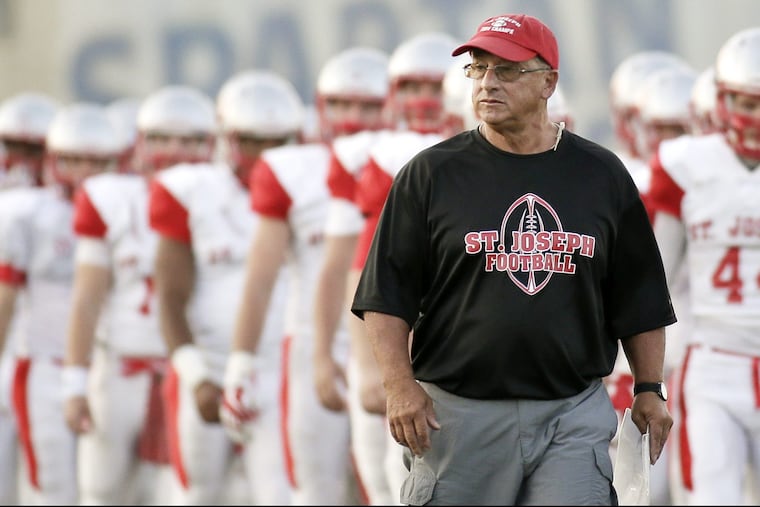St. Joseph football coach Paul Sacco accuses Diocese of Camden of ‘vindictive effort’ to close the Hammonton high school
The school has reopened as St. Joseph Academy, which will sponsor several athletic programs, with Sacco’s team scheduled to begin another season in the West Jersey Football League.

Paul Sacco, the winningest high school football coach in South Jersey history, has issued a blistering rebuke of the leadership of the Diocese of Camden for a “malicious and vindictive” effort to close St. Joseph High School in Hammonton.
“Evil, Evil, Evil,” Sacco wrote of decisions made by diocese leaders with regard to the small Catholic school renowned for the strength of its football program.
The diocese in April announced plans to close St. Joseph as well as Wildwood Catholic high schools, citing mounting debt and shrinking enrollment. Both schools have since announced they will reopen this school year as independent entities under the names of St. Joseph Academy and Wildwood Catholic Academy, respectively.
Sacco, who won a South Jersey-record 336 games in his career and led St. Joseph to 20 state titles since the creation of the non-public state playoff system in 1993, said diocesan leadership was determined to shut down the school in part of because of “animosity” toward the coach and his football program.
“This is my candid account of how the Diocese of Camden tore apart hundreds of families of the greater St. Joseph community with its malicious and vindictive effort to forever close St. Joseph High School,” Sacco wrote in a letter that was sent to The Inquirer and other news media.
Diocese of Camden spokesman Michael Walsh disputed Sacco’s version of events.
“Coach Paul Sacco’s love for his football team and the St. Joseph High School community is well known,” Walsh wrote in an email. “Unfortunately, his perspective does not equate to the facts. The Diocese has never had any desire to close St. Joseph High School or any of the dozens of schools that have been closed over the last 20 years.
“Schools close for one reason, declining enrollment.”
St. Joseph Academy announced Wednesday that the school would be housed in its old location on Vine Street, leasing the building from the Hammonton Board of Education. The school will sponsor several athletic programs, with Sacco’s team scheduled to begin another season in the West Jersey Football League in early October.
» READ MORE: Behind closed doors with the St. Joseph football team
Sacco’s said the diocese for the last several years was engaged in an effort to “starve the school of cash” and force St. Joseph into financial difficulties that would necessitate its closing. In announcing the closing of the school, the diocese said that St. Joseph’s enrollment was down to 206 students and that the school has received loans of $1.1 million with an outstanding debt of $6.6 million.
“The Diocese of Camden spent millions of dollars supporting St. Joseph High School for decades, as it has done for many schools in the diocese, only to see SJHS’s enrollment decline by nearly half from 387 in 1999/2000 to 206 in 2019/2020,” Walsh wrote.
Sacco also wrote that the diocese has been “against the football program and me directly.”
St. Joseph has traditionally been one of the strongest programs in South Jersey, known for its offseason conditioning and more than capable of competing against the biggest schools in the area.
“I cannot think of any plausible reason for its animosity towards me and this program,” Sacco wrote. “I have always tried to teach the boys more than football.”
Sacco also criticized the diocese for its decision to close the school in the midst of the coronavirus outbreak and for its unwillingness to cooperate with St. Joseph Academy in its effort to purchase or rent buildings and athletic facilities.
He wrote that the athletic fields on Wood Street, the football team’s former home, are now “overgrown with weeds” and that the diocese has refused to allow the new school to use the gym at the now-empty elementary school on Third Street.
“Why can’t the new school rent it?” Sacco wrote. “Why can’t it use it? If the building is sold, that’s different. But it’s sitting empty. Why not let the children play? Evil, Evil, Evil.”
Walsh wrote that “no attempts were ever made” by the diocese to create barriers to the new school but that decisions related to property were made “to pay off enormous debts that both schools continue to carry.”